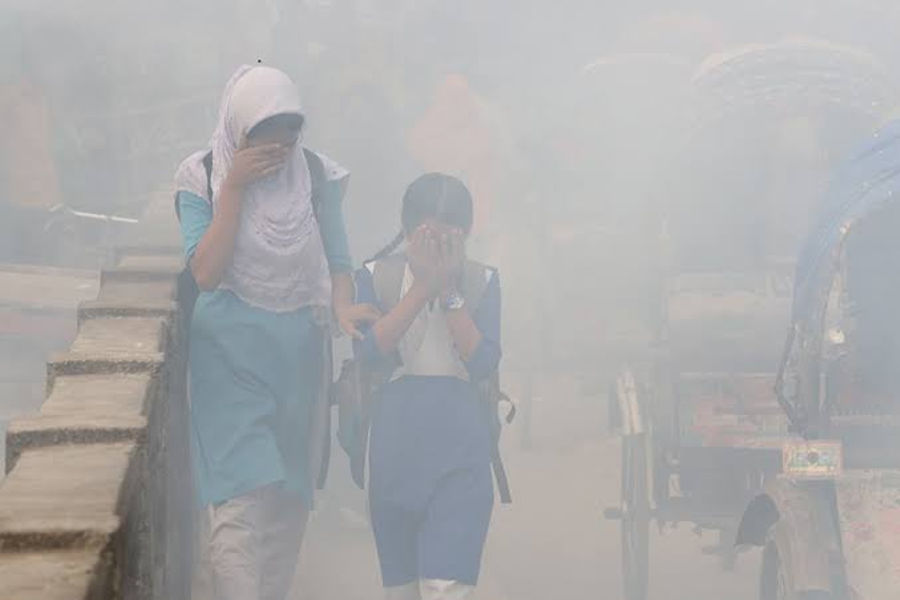
Published :
Updated :

Dhaka is often making headlines for ranking as the most polluted city in the world in the Air Quality Index (AQI). The air quality of the city of around 20 million people remains in the "very unhealthy" and "hazardous" categories around the year, but its pollution level reached catastrophic levels during the winter, leaving the metropolis in a suffocating state. Temperature inversions and increased emissions during the season result in the city's AQI often exceeding 300, far above the safe threshold of 50 in the index, which measures particulate matter (PM2.5 and PM10), nitrogen dioxide, sulfur dioxide, carbon monoxide, and ozone levels.
The main contributors to Dhaka's air pollution are diverse, but they are interconnected. The number of vehicles in the city is increasing with every passing day and has already reached a million to cater to the needs of its burgeoning population. The exhaust from the vehicles, most of which are poorly maintained and lack proper emission controls, is a major source of pollution. Thousands of brick kilns surrounding Dhaka, which use outdated technology, burning coal and other polluting fuels, are another big contributor. According to studies, these kilns contribute nearly 60 per cent of Dhaka's PM2.5 pollution.
The rapid growth in urban population requires the city to construct more and more buildings and other establishments but the construction is not properly regulated. Such unregulated building practices and poorly maintained filthy roads generate massive amounts of dust, factories in and around the city emit pollutants, including particulate matter and toxic gases, while nonstandard waste management practices, such as the open burning of garbage, release harmful chemicals and particulates into air worsening its quality.
The impacts of the air pollution in Dhaka are immense. It not only causes an environmental catastrophe, but also takes a heavy toll on health of people and other animals living here and creates a socio-economic burden. According to the State of Global Air (SoGA) 2024 report, air pollution was responsible for over 235,000 deaths in Bangladesh in 2021, with a significant percentage occurring in Dhaka. Exposure to toxic air exacerbates respiratory diseases such as asthma, and chronic obstructive pulmonary disease (COPD), while long-term exposure causes lung cancer, impairs cognitive development in young population and increases the risk of cardiovascular diseases in older people.
The economic loss of air pollution is staggering. According to the World Bank, Bangladesh's economic losses from air pollution were estimated between 3.9 per cent and 4.4 per cent of the country's gross domestic product (GDP) in 2019.
The government has implemented several initiatives to tackle air pollution. They include introducing compressed natural gas (CNG) for vehicles, promoting cleaner technologies for brick kilns, shifting polluting factories outside the capital, and lately encouraging use of electric vehicles. These efforts, however, have not yielded desired results, mainly due to weak enforcement of regulations, lack of coordination, and limited public awareness. Corruption and lack of accountability often allow polluters to evade regulations here.
Addressing Dhaka's air pollution crisis requires a multi-pronged approach involving government agencies, private sector stakeholders, and civil society. The government needs to strengthen regulatory frameworks and ensure strict enforcement of emissions standards for vehicles and industries, phase out outdated brick kiln technologies, and ban the open burning of waste.
It also requires promoting green urban planning, ensuring more green spaces in the city, introducing dust control measures at construction sites and roads, and replacing dilapidated buses with environment-friendly electric vehicles. Public awareness campaigns are necessary to educate citizens about the causes and consequences of air pollution, and encourage them to participate in initiatives like tree planting and waste management.
rahmansrdk@gmail.com


 For all latest news, follow The Financial Express Google News channel.
For all latest news, follow The Financial Express Google News channel.